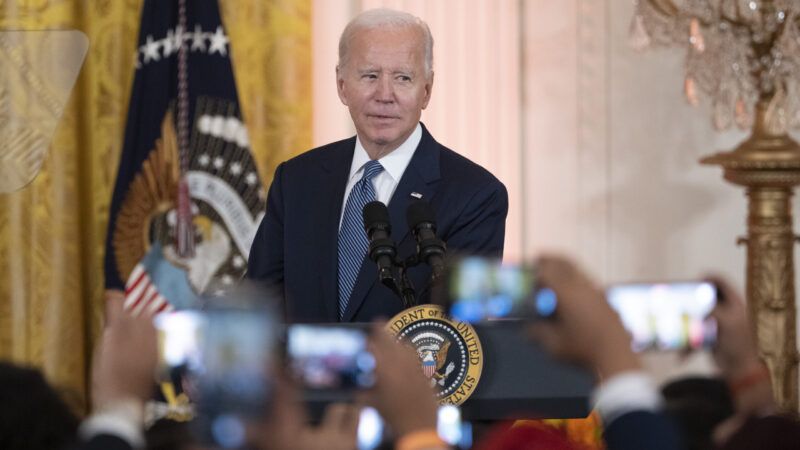Biden Mistakenly Imagines That Congress Approved His Student Debt Cancellation Scheme
The lack of statutory authority is the main issue raised by legal challenges to the plan.

President Joe Biden recently claimed his student loan forgiveness plan was authorized by "a law" that he "just signed" after Congress narrowly approved it. "It's passed," he said during a NowThis News panel discussion. "I got it passed by a vote or two."
In reality, the debt cancellation program was never approved by Congress, which is the main argument underlying several legal challenges to it. By trying to unilaterally relieve some 43 million Americans of the obligation to repay the money they borrowed for college, those lawsuits say, the Biden administration overstepped its statutory authority, violating the rule of law and the constitutional separation of powers.
In August, the administration announced a program that would cancel up to $10,000 in student debt owed by individuals earning less than $125,000 a year or couples with incomes below $250,000. Recipients of Pell Grants would receive up to $20,000 in relief.
Penn Wharton researchers project that the plan could cost more than half a trillion dollars over 10 years, even without taking into account the administration's proposed changes to the income-driven repayment program, which likewise will reduce what borrowers owe. The beneficiaries include many Americans who could readily afford to pay off their loans, while the people picking up the tab include many Americans of more modest means.
Since voters with college degrees favor Democrats, the political advantages of announcing this perverse redistributionist scheme a few months before the midterm elections are pretty clear. The plan's wisdom and fairness are much more debatable, and its legal basis is even more dubious.
The Biden administration claims that Congress authorized mass student debt cancellation in 2003, when it approved the Higher Education Relief Opportunities for Students (HEROES) Act. That law allows the secretary of education to "waive or modify any statutory or regulatory provision applicable to" certain student aid programs "in connection with a war or other military operation or national emergency."
The timing of that law, the comments of its supporters, and the bill's "findings" show that it was aimed at helping "the men and women of the United States military," whose Iraq War duties might interfere with their ability to make loan payments or meet bureaucratic requirements. But the Biden administration argues that the COVID-19 national emergency is a license to reduce or eliminate the debts owed by more than 40 million Americans, regardless of whether the pandemic actually hurt them financially or impaired their ability to meet their loan obligations.
Inconveniently for Biden, he declared that "the pandemic is over" weeks before the Department of Education planned to start implementing the debt forgiveness program. Furthermore, the federal government froze interest accrual and waived loan payments for most borrowers during the pandemic, and that forbearance extends until the end of this year, which makes the alleged connection to this particular national emergency even more tenuous.
Before Biden suddenly discovered the authority to forgive student loans en masse in the HEROES Act, members of Congress repeatedly tried to achieve similar ends through legislation that went nowhere. House Speaker Nancy Pelosi (D‒Calif.) emphasized that only Congress could authorize the sort of relief Biden is now touting.
"People think that the president of the United States has the power for debt forgiveness," Pelosi told reporters in July 2021. "He does not. He can postpone, he can delay, but he does not have that power. That has to be an act of Congress."
The Education Department agreed with Pelosi's assessment before reversing that position to accommodate the president's plans. Until recently, Biden himself was not claiming that he could unilaterally forgive student debt, instead saying he would happily sign a bill to that effect.
Contrary to what Biden mistakenly recalled during that NowThis conversation, Congress never passed such a bill. The question for the courts, assuming that plaintiffs can establish their standing to challenge his debt cancellation program, is whether he can do what he wants regardless of what the law says.
© Copyright 2022 by Creators Syndicate Inc.


Show Comments (55)